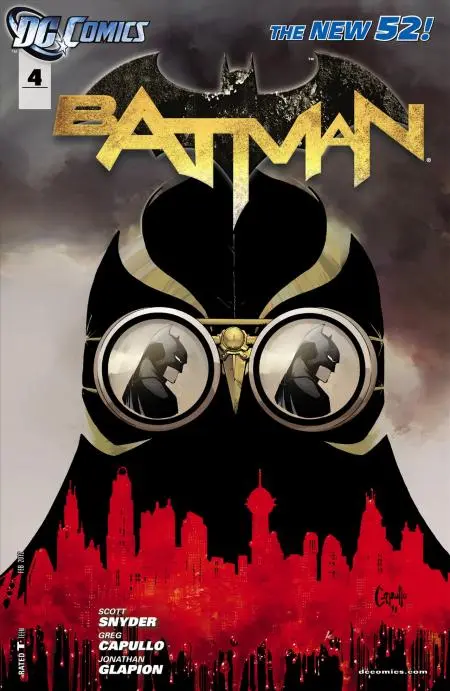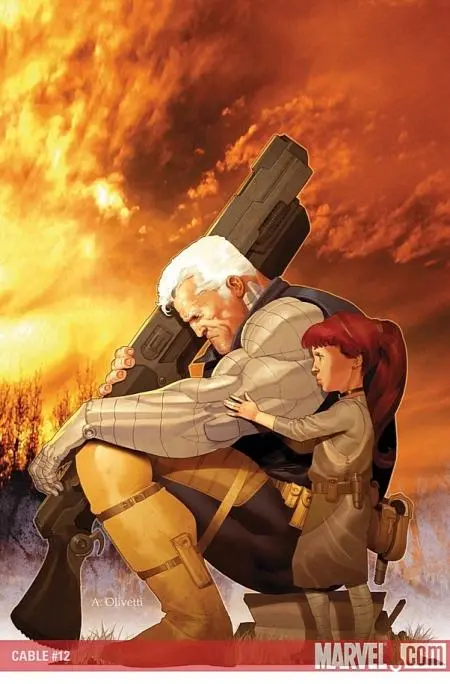As both a voracious and vocal comic book aficionado, I frequently answer the questions of those who are sadly unfamiliar with the form. In the steadfast hope of alleviating their condition, I always do my best to answer them honestly, succinctly, and then direct them to where they can learn more. By far the most common question I am asked is, Where to begin? There is so much material, so many titles to choose from, and all of it comes pre-packaged with decades of history—it’s quite easy to become overwhelmed. Honestly, it is so much easier to start when you’re young, because a five year-old’s brain is much more elastic than an adult’s, and much easier to stretch to accept and accommodate all of the strange stories comics can throw at it. But don’t despair if you’re late to the party—the form has definitely matured and improved with time, and has only become more entertaining for adults as the writing and the characters have developed more complexity. Now more than ever is the time to pick up a comic book and start reading.
Even after twenty years as a devout fan, I am still quite often astounded by the immensity of it all when I try to pick up a new comic or character after being away for a while. Since I started reading comics at age nine, I've had to put them away for a while at least four times in my life. Each time it was difficult to get back on the horse, but every time it kicked me off, I learned a few new tricks for climbing back on. The key to making sense out of the vast cosmos of comic books is finding a way to narrow your focus. Deciding what to focus on helps you decide what to ignore, and thus a massive fictional universe is pared down to a manageable size.
Pick A Character
The obvious way to get started is to just pick a character that interests you and start reading everything you can about them. It’s a simple and effective way to introduce yourself to the world of comic books. Focusing on one character is a good way to learn about the rules and styles employed in the stories. It’s also the easiest filter to use—you can ignore any titles that don’t feature your character. Unless you pick someone like Wolverine or Batman, you can get away with buying just one or two titles a month. It also thins the relevant back catalog, which makes getting up to speed go that much faster. Major characters typically get reinvented about once a decade to snag young new readers, so jumping on points are far from scarce. I remember when I was nine years old and I saw in a newspaper, a real honest to goodness newspaper for grown-ups, that Superman was dead. The death of a fictional character was front page news in the real world. Immediately I knew I had to read this story, and as soon as I had finished it, I knew I would never stop reading. Twenty years later, I’ll still buy any book about the Man of Steel.
DC Comics made it easier than ever to get on board last year when they rebooted their fictive universe with fifty-two brand new first issues, most of which were pretty good. If you ever wanted to pick up on Superman or Batman and never knew where to start, this is your chance. “Night of the Owls” Batman’s first crossover event since the rewrites, is an epic gothic tale in which the Dark Knight’s enemy is the city itself and the past. It hits every high note of a noir classic . In the pages of Action Comics, the publication where Superman was born, you can now watch Grant Morrison deconstruct him yet again—always a laugh. Wonder Woman is the most wonderfully written and unfortunately illustrated book of the year, but still worth a read.
As for Marvel’s holy trinity, they’ve all recently endured resurrections or recoveries, so they’re all looking for new beginnings, too. Iron Man underwent a personal upgrade during the events of "Extremis" and "Stark: Disassembled", and watching Tony put himself back together gives the reader a very intimate portrait of a flawed hero. The third volume of Thor begins with the thunder god’s return to Earth after a long time dead, and Ed Brubaker began a truly legendary 8-year run on Captain America with the assassination of the title character. It’s not always as easy as finding an issue one, but stories that begin immediately following a character’s recovery from death typically mark a great starting point. Even if you pick up in the middle of a story arc, if you stick with one character long enough, it will eventually start to make sense.
Pick A Team
The sports approach, similar to picking a character. It can make it a little more difficult to get started, but it’s a great method for branching out into unfamiliar territory. Reading the team books is like going to a big college party—you get to meet lots of new people and learn what they’re all majoring in. Books that focus on teams introduce you to a wider range of characters, and help you get an idea of the breadth of what the world you’ll be reading about contains. Picking a team is like selecting a primer for the fictional universe you will be exploring. Normally, vampire gods and alien robots don’t ever appear in the same stories, yet there they are, working together. Team adventures are typically either big action blockbusters or fun genre mash-ups that strive to fully utilize each member. If you’re lucky, your favorite teammate also has his or her own book. Maybe they’re next in the movie franchise pipeline, or maybe they’ve been reduced to a two page humorous back-up piece in a more important book. If you’re going to use the pick-a-team approach, just beware that you will most likely want to have a Wikipedia page open while you’re reading for quick reference.
When I was twelve years old, I got hooked on the much beloved 90’s X-Men cartoon. I had never heard of any Marvel characters other than Captain America, but these heroes were unlike any I had read about before. Not only were they outcasts, rejected by the society they strive to protect, but they were flawed, just like real people. I had to know more, and I was overwhelmingly thrilled when I discovered that not only were there more characters on the team than in the show, but I could probably spend the rest of my life reading nothing but X-Men comics and still never read it all. This team was an endless well of sci-fi adventure that I could go back to over and over again without ever seeing the same thing twice (unless I wanted to). For my money, X-Men is the best ongoing serial narrative in comics of the last decade, if not ever. A good place to start is the "House of M" series, which I explain in more detail here. This event has had far-reaching implications for the world’s favorite mutants that are still driving their stories today. If you don’t want to go quite that far back, you can pick up "Messiah Complex", which is about the first mutant born since M-Day and the mad scramble of all the various factions to either save, control, or kill her. Hope (the newborn mutant) has really grown into a compelling character since her introduction and has become one of my favorites. Seriously, if you read about how a young mutant messiah is raised on the run by a time-traveling soldier and are not moved, just throw your heart in the trash because it is BROKEN.
Pick A Writer
If there isn’t a particular character or team that intrigues you, or too many do and you just don’t know where to start, finding a writer you like can be the deciding factor. In fact, finding a favorite writer and following them across multiple titles is a great way to discover the diverse range of stories available to the comic book reader. Few of us only like to read in just one specific genre, and the same is true of the writers. Although they have their strengths, like Brubaker’s obvious mastery of the urban noir style or Morrison’s trademark metafictional madness, comics often give them a chance to do something completely different. Brubaker wrote "The Rise and Fall of the Shi’ar Empire", the X-Men’s best interstellar adventure since the "Dark Phoenix Saga", and Morrison has recently concluded an uncharacteristically simple and straightforward interpretation of young Superman in Action Comics.
Once you find a writer you like, it lowers the barrier to reading other comic books. It doesn’t matter if it’s a character you’ve never heard of in a genre you never read, you can trust this author to show you a good time no matter what weird world you stumble into. And for your sake, please read some Dan Abnett. This guy writes ALL THE COMICS. I knew his work from the Black Library, for which he writes some of the very best Warhammer 40,000 novels. Nobody does big, bold, badass sci-fi better than Abnett, and a more qualified guide to the Marvel universe you will not find. Before Guardians of the Galaxy, I was aware that alien empires existed in Marvel, because they were always trying to conquer Earth, but that was all—I had no idea where they came from or who they really were. But Abnett has produced a plethora of awesome outer space epics with Nova and The Annihilators, which includes the terrifically fun continuing escapades of Groot and Rocket Raccoon. Whether you’re a novice or an old fan just looking to read something different, picking a writer to follow can often be the most rewarding path through the field of comic books.
Pick An Event
When I was in college, I didn’t have the money or the time to read comic books. I lost touch with those worlds, and years later, after I quit drinking and started working in a bookstore, I returned to them as a stranger. Since I had no idea where to begin, I decided to take the opportunity to explore a new character and picked up "The Sinestro Corps War", an 11-part story about an interstellar conflict fought between the Green Lanterns and the titular villain’s yellow lanterns. It turned out to be the perfect entry point to a sci-fi mythos that finds a fun balance between space opera and space cops. Now I read every issue of every Green Lantern title, which thankfully we got more of this year.
Despite what generations of devout nerds may have led you to believe, it is impossible to know it all. They’ve been printing comics for over 70 years now, and even if it were possible to read every last one, you wouldn’t remember every single story and character. But that’s okay. You don’t need a functioning knowledge of the entirety of comics’ continuity—that’s what the internet is for. All you need is a major event, a point of reference to start building a timeline in your own head. Fortunately, comic books, especially after the late 90s, are littered with these massive crossover adventures, featuring everyone fighting everyone, with everything hanging in the balance. Find an event or storyline that interests you and read every single issue, prelude, tie-in, and crossover you can find related to it. This approach is jumping into the deep end. By the time you crawl out the other side you will have a frame of reference to further your understanding. There’s really no better way to start learning about a fictional world.
Those are just some of the easier ways to get started, and they are by no means exclusive. Oftentimes by following a particular character I am introduced to new writers, and as I consume a favorite author's back catalog, I might discover a character that was unknown to me, and the cycle continues. No matter which method you choose, you will never have a shortage of interesting stories to read.
Image via Hehlfire

About the author
BH Shepherd is a writer and a DJ from Texas. He graduated from Skidmore College in 2005 with degrees in English and Demonology after writing a thesis about Doctor Doom. A hardcore sci-fi geek, noir junkie and comic book prophet, BH Shepherd has spent a lot of time studying things that don’t exist. He currently resides in Austin, where he is working on The Greatest Novel Ever.










